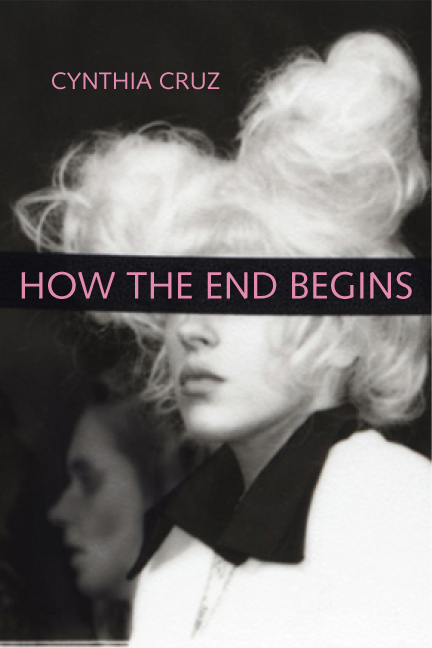
paper • 74 pages • 15.95
ISBN-13: 978-1-935536-67-3
Read a piece by Cynthia Cruz on the influences behind How the End Begins for Blunderbuss Magazine.
How the End Begins is about the world’s seductions, its incessant clamoring for more which is juxtaposed against the invisible world: the quiet, the call of the desert, and the pull to faith. The book chronicles this move toward faith and away from the “dingen” (things or stuff). How the End Begins is a burning down, a kind of end of the world while, at the same time, a new, triumphant beginning.
“Self Portrait: Polaroid,” from How the End Begins:
Our very own Pharmacopoia blonde
In blue powder eye shadow, or
Luminous nurse of the locked ward,
This sweet, licked delirium. Of teeth,
Dirt, and seed. Alone, in my dream
Room, listening careful
For the second coming.
“Loneliness and death are never the same, but in How the End Begins, Cynthia Cruz parses their similarities and differences so exquisitely and obsessively that trace patterns begin to appear on the surface of experience. These are poems of grief and recognition, of both elegy and opulence: they glitter, sometimes fiercely with an icy moonlight, sometimes with the disposable bling of contemporary American culture, sometimes with either the glimmer of faith or else its devastating absence. ‘With you missing,’ Cruz declares in one poem, ‘All the pretty animals are game for the killing.’ The same can be said for this ravishing, deeply abandoned collection.” — G.C. Waldrep
“Cynthia Cruz continues to write the soul in its fullness and emptiness with markings that bring what is possible in seen and unseen worlds into a single line. This is poetry from the mind of a poet who can sit in Dickinson’s finite but overwhelming complex to see her own self contemporarily where everything and nothing live inside one another. ‘There is no city / but the city within…’ Cruz writes, and she is the grand cartographer of that place in poetry where the beauty of imaginative truth sings itself real in tiny moments. How the End Begins is the experience of what makes us human.” — Afaa Michael Weaver
“In these poems…Ms. Cruz does more than just brood on death, mental illness, and the minefields of girlhood– she gets this close to the thing itself, to ‘the pilot / Blue light of the mind’ going out…
These are melancholy spells of damage and sad madness chanted by children high on glue, crystal meth, and ‘dream pills’ who can’t keep up with this too-fast world, boys and girls who have become prey…
The Glimmering Room is an exquisite fever dream of drugs, anorexia, and unwanted sex (in both senses of the word) populated by young women and men–the walking dead–who have lost all sense of where the edge is….
Her fierce care for these characters and the attention she lavishes on them redeems them. And she declines to leave the reader and her lonely children with mere despair. The last lines of the book’s final poem, ‘Gone, Galore,’ leaven the suffering in The Glimmering Room with a tender touch, like a parent brushing the hair from a child’s eyes.” — Dana Jennings, The New York Times
“In her fourth collection, Cruz (Wunderkammer) continues to deliver surprises with lyric poems that are deceptively sparse yet dense with texture and meaning….” – Publishers Weekly, March 2016 Read the full review.
“…Cruz is a poet here obsessed with the wounds and wonders of childhood, and she nests both within a floating snowglobe of synth music and feathered morbidity. The collection co-opts the imagery of fairy tales and dreams to lull the reader into its world of tortured, titillated reverie….” — Fourth & Sycamore Read the full review.
“…Each poem links up—in tone, in cadence, in metaphor—with its antecedent(s). Indeed, it’s hard to suggest reading any but a few of the poems on their own (or, perhaps, hard to imagine them being as effective as they are here). As it is, the narrative is a weaving of dreams and visions, drugs, madness, the ups and downs, days of light and of darkness, of a depressive, or of a madwoman….”— The Rumpus Read the full review.
“Cruz’s penchant for evoking the ethereal and haunted without sinking into melodrama and camp is dazzling; the weight of these poems rests on the thinnest transparent ice, but they don’t fall through.” — Fourth & Sycamore Read the full review.
“…To experience this feminist imagination is to step ‘inside the warm lung of the chronic,’ where the reader breathes in the ‘beautiful toxin’ of each inevitable word.”— SCOUT Read the full review.
“With its emphasis on slow catastrophe, eschatological crisis, and damaged dream worlds, How The End Begins is a significant addition to Cynthia Cruz’s distinctive canon.”— The Kenyon Review Read the full review.
“The reader must stumble in the fog of Cruz’s mischievous hallucinations. It’s a pleasure.”— LitHub’s 30 Poets You Should Be Reading Read the full review.
“These poems are both fierce and delicate, they own each of these words outside of their various connotations; instead of Jean-Paul Sartre’s paper knife and Adrienne Rich’s glass pen we find in Cynthia Cruz’s collection a glass knife glittering with its ability to pierce the heart.”— Fork & Page Read the full review.